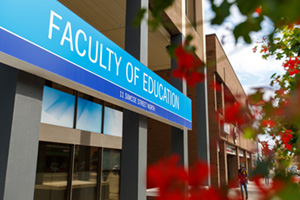Helping kids learn computer coding begins with helping teachers
UOIT Faculty of Education launches new courses in coding and digital literacies
October 5, 2015

Critics of Canada’s education system say our youngsters are not gaining the basic computer science knowledge and skills they will need to help make our country technologically competitive in the future. Education is no longer simply about the so-called ‘3 Rs’.
In most cases, computer programming is still not integrated into the elementary curriculum in Canada. Further, digital literacy and coding are not even core subjects in high school: young Canadians are only exposed to these topics if they happen to take an elective course.
“Many other countries have already made the move in their educational systems to teach the fundamentals of computer code, as early as the age of five,” says Dr. Ami Mamolo, Assistant Professor with the Faculty of Education (FEd) at the University of Ontario Institute of Technology (UOIT). “Canadian parents have also shown interest in coding for their kids, as we’ve seen in recent news stories. Our university has been listening and is embracing educational coding with new courses to ensure the next generation of teachers is well-equipped to help their students be active participants in a digital world and be better prepared for future workplaces.”
“Young Canadians are clearly growing up in a vastly different technological environment than even the most recent generation did prior to Y2K,” says Dr. Diana Petrarca, Assistant Professor, (FEd), and Director of the Bachelor of Education program at UOIT. “Change happens so quickly and the Ontario curriculum has not yet been updated to include coding in the same way educational systems are in countries like England and Australia.”
“Ontario’s expanded and enriched four-semester teacher education program has provided us with the opportunity to rethink and redesign our approach to teacher preparation at UOIT, by promoting curricular integration and introducing innovative new courses,” says Dr. Suzanne de Castell, Dean of the Faculty of Education and international leader in the area of equity-based technology-enhanced learning.
For example, UOIT Faculty of Education teacher candidates are taking brand new courses in Coding and Communication; Digital Literacies; and Learning in Digital Contexts. These courses introduce leading-edge approaches for learning the basics of coding, the languages of computer programming, including topics such as:
- Adaptive and assistive technologies
- Coding educational games (game-based learning)
- Considerations for embedding digital technologies in diverse learning environments
- Developing and designing mobile apps and websites
- Digital storytelling
- LEGO robotics, Raspberry Pis and wearable technologies
- Science, technology, engineering, arts and mathematics (‘STEAM’) learning
“We are also addressing the issues of technology-enhanced learning and the intersections of race, gender, ethnicity, class, ability and culture as they relate to the consumption, production and utilization of technology,” says Dr. Janette Hughes, Associate Professor, FEd. “Coinciding with our new coding and digital literacy courses, we are also launching our new STEAM-3D Maker Lab. The lab focuses on designing, observing and evaluating the impact of a ‘maker-space’ or production approach that facilitates the discovery, design and development of digital products for students of all ages, their teachers and the community to promote greater interest in STEM through the Arts (STEAM).”

Complementing the Faculty of Education curriculum for teacher candidates, the university also holds Summer STEAM and LEGO teacher workshops for all interested Kindergarten to Grade 12 teachers. UOIT also offers an exciting array of popular opportunities throughout the year for hundreds of youngsters in the community to engage digital literacy concepts:
Media contact:
Communications and Marketing
University of Ontario Institute of Technology
905.721.8668 ext. 6709
communications@ontariotechu.ca



